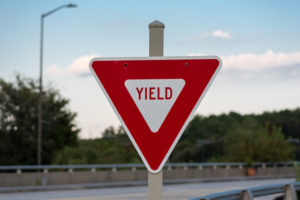What You Need to Know About Failure to Yield to Accidents in West Palm Beach
As drivers, we have to make quick decisions when faced with a yield/don’t yield situation. All most of us remember is that the “driver on the right has the right of way.” Beyond that, when to yield and when not to yield is a part of driving education that is often overlooked or ignored.
In Florida, the law specifies instances where a driver must yield to pedestrians, bicyclists, and other vehicles. A driver turning left, for example, must yield the right of way to oncoming vehicles, which fortunately is simply common sense. Furthermore, most of us have the common sense to yield to pedestrians and bike riders.
If you’ve been involved in a car, truck, or boating accident in West Palm Beach, Florida because of another driver’s failure to yield, a Florida accident lawyer at Searcy Denney may be able to recover financial compensation for your injuries.
When Do I Have to Yield in Florida?
According to the Florida Drivers Association, the answers may be found in the Florida Driver Handbook. According to the Handbook, no driver has the “right of way.” The law only lays out who must yield. Whether they’re driving a car, motorcycle, scooter, or bike, every driver must do everything possible to avoid a crash. This even applies to pedestrians who often walk through traffic as if they’re entitled to walk whenever and wherever they want.
In West Palm Beach, Are There Specific Circumstances When a Motor Vehicle Must Yield?
Yes. The Handbook lays out these circumstances, including:
- Stop Signs. Hopefully, drivers already know this. Drivers must yield the right of way to all other traffic, bike riders, and pedestrians at stop signs. You may only proceed when traffic is clear. At four-way stops, drivers may proceed in the order in which they arrived. If two vehicles reach the intersection at the same time, the driver on the left yields to the driver on the right.
- Open Intersections. An open intersection is one without traffic control signs or signals. When you enter one, you must yield the right of way if a vehicle is already in the intersection or you plan to make a left turn and a vehicle is approaching from the opposite direction. When two cars enter an open intersection at the same time, again, the driver on the left must yield to the driver on the right.
- Roundabouts. Popular in Europe, we find relatively few in the U.S., although the number is growing. Most roundabouts do not require stopping, which allows vehicles to move continuously through intersections in a counterclockwise direction at the same low speed. Drivers entering the roundabout must yield to those vehicles already in the roundabout. Of course, any traffic signs must be obeyed.
Are There Any Other General Rules?
It’s either the law or common sense that drivers should yield to:
- Pedestrians
- Bicyclists
- Blind Persons
- Mobility-Impaired Persons
- School Buses
- School Crossings
- Public Transit
- Funeral Processions
- Driveways
- Emergency Vehicles
A Florida Accident Lawyer Understands the Yield Laws and Can Help if You’ve Been Injured By Another Driver’s Failure to Yield
Yield laws are designed to keep traffic flowing smoothly and safely in West Palm Beach and throughout Florida. Unfortunately, some drivers drive as if they always have the right of way. Safety for yourself and others is your top priority. If another driver fails to yield, don’t fly off into road rage, simply wait another few seconds, and you’ll be able to proceed safely. A Florida accident lawyer at Searcy Denney can help you if you’ve been injured in an accident. Contact us to schedule your free consultation. We work on a contingency fee basis.
Share This



